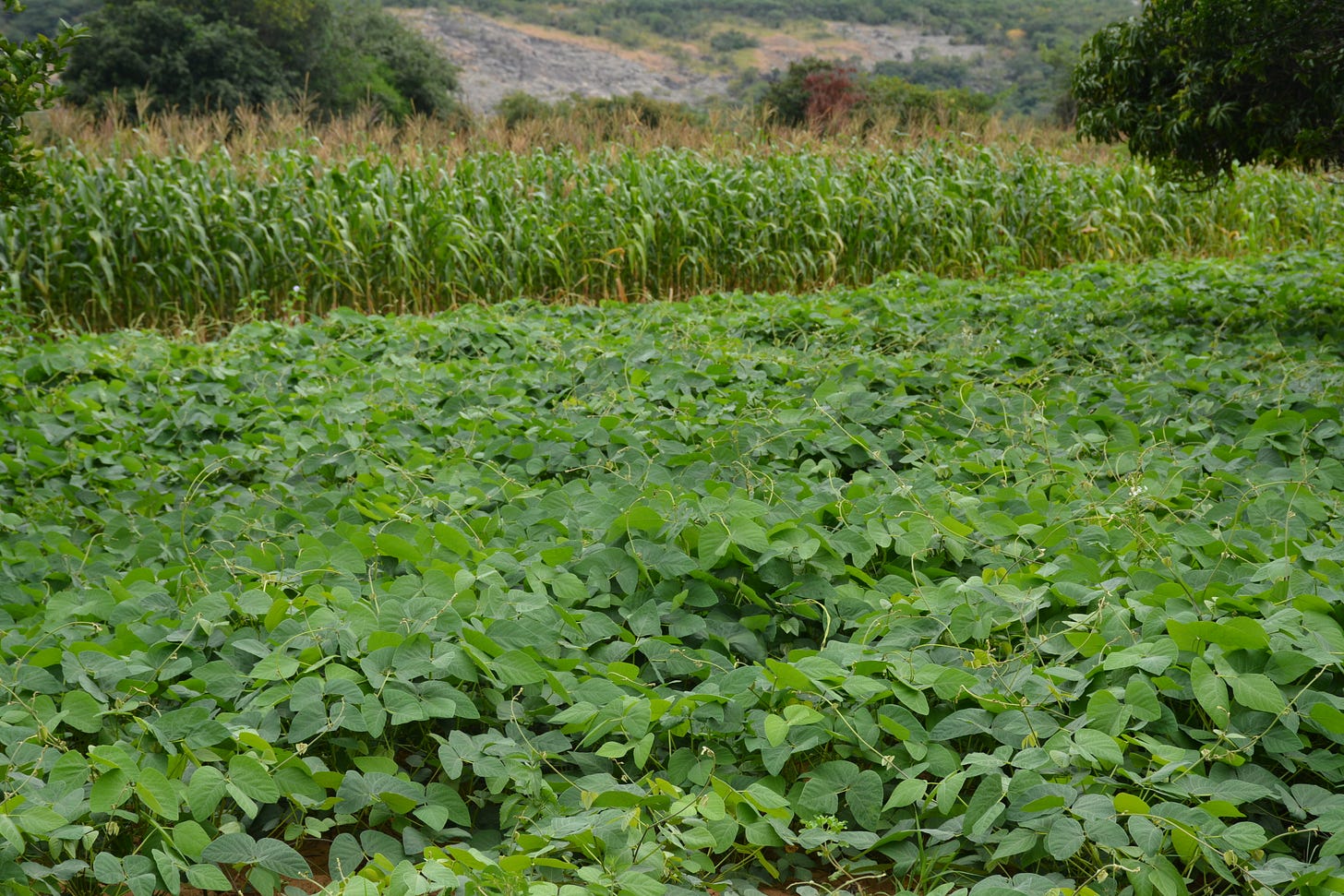Adaptation lessons on the airwaves
Farmers in rural Zimbabwe are using radios to deal with freak weather events. Plus, an interview with Stop Funding Heat on why we shouldn't pay for climate lies.
🌏 You can expect more positive climate coverage from Ours to Save over 2022, with a deeper focus on video and visuals. As always, the best way to support us is by becoming a paid subscriber. This will ensure we can keep publishing forward-thinking environmental journalism. 🌏
Zimbabwe’s farmers turn to radios for climate resilience
An initiative by Environment Africa provides rural farmers with radios to help them adapt to changing weather. By Tafadzwa Muranganwa.
The COVID-19 pandemic continues to wreak havoc on farmers like Webster Chinyange who lives in the Guruve district - situated over 150 km from Zimbabwe’s capital, Harare. Here, the quest to adapt to climate change remains critical.
Due to lockdown, gatherings are restricted in this southern African country, preventing Chinyange and other farmers from congregating to hear the latest news from the government’s agricultural officers. These officers provide vital information to counter the effects of climate change.
But thanks to an initiative by NGO Environment Africa, Chinyange and over 35 others farmers have benefitted from portable radio handsets. These keep them up to date with information on climate change mitigation and adaptation methods.
It’s “the biggest thing to have happened to us farmers in Chiwundura”, he says.
“[The radios] were supplied together with flash disks, which teach us how to deal with the changing climate. The climate-proofing methods include using open-pollinated maize seeds, which are short-to-medium season varieties.”
According to the Sustainable Food Trust, open-pollinated seeds – as opposed to hybrid seeds, which grow into most of the fruit and veg you’ll see in supermarkets – give plants an adequate ‘genetic toolbox’. This helps them ‘adapt to changes in weather and climate, and fight diseases and pests.’
Chinyange says farmers are also discouraged from using fertiliser on crops, as it harms the environment.
“In the lessons we are getting, we are encouraged to use manure instead of fertiliser, which can harm the environment and accelerate climate change.”
Enhanced Indigenous Knowledge Systems
The ‘Indigenous Knowledge Systems’ information - sent from the government’s Meteorological Department officials via radio - is another important resource for the farmers fighting climate change.
“The IKS information that we get from the Meteorological Department guys on the radio has been handy,” said Mr Chinyange
“Often, we are well-prepared in the event of a drought or any other weather calamity, just by checking the IKS.”
52-year-old Alice Muza of Kazunga Village says the radios have not only benefited the farmers working with Environment Africa, but the whole community.
“While the radios were given to those of us working with the EA, the information on climate change is now being embraced by others outside of the programme.
“They come to listen to the advice we are getting, like practising intercropping and crop rotation. The radios have kept us up-to-date with weather information from the Met Department, making planning easy.”

Climate resilience
‘Upscaling Climate Resilience Food and Nutrition Enhancement’ is an EA project supporting 300 farmers in this area. According to its field officer, 40 radios have so far been donated.
“We have distributed 40 solar-powered radio handsets, and 80 flash sticks with recommended training material on weather information and interpretation. This way the farmers can understand changing weather patterns and how these factors impact crop production,” explained Mr Peter Phiri, Environment Africa Field Officer of the Guruve district.
“The farmers are now equipped with post-harvest handling skills, like using a sheller to reduce maize grain losses.”
Tafadzwa Muranganwa is a journalist from Zimbabwe’s Honde Valley, currently based in Harare. Follow him on Twitter.
Calling out climate lies in the media
Stop Funding Heat wants to stop the promotion of climate misinformation by the press. By Imaan Asim.
Fossil fuel companies have grown increasingly savvy in their greenwashing efforts – from partnering with Instagram influencers, to sponsoring news organisations like The New York Times. This begs questions about how much autonomy they have over the information they release.
The campaign Stop Funding Heat seeks to shed light on ‘coordinated climate lies as well as subtler forms of climate misinformation’. Formed in 2020 and run mostly by volunteers, they have exposed climate misinformation in a number of leading UK newspapers.
Stop Funding Heat also analyses social media platforms, primarily Facebook which permits climate denial to spread as it provides ‘good business’. They estimated that there are between 818,000 and 1.36 million daily views of climate misinformation on the platform, of which only 3.6% are fact-checked.
As online information spreads like wildfire, this is incredibly dangerous - especially when coupled with real-life events intended to support our dying planet, such as COP26 where fossil fuel companies sent 500 lobbyists to the event - more than any other country and outnumbering the official Indigineous constituency.
Recently, Avaaz has released a climate report, titled ‘Meta-Denial: How Facebook Fails to Keep Up with the Evolving Tactics of Today’s Climate Misinformers’, where they found that the top five climate misinformers on Facebook racked up over 61 million views during an 8-month period. As 88% of their posts did not have fact-checking labels, Facebook has become home to many of these voices, although Meta claims that there is no evidence that the platform has adverse effects of climate change.
A definition for climate misinformation
In order to dig deeper, Ours To Save spoke to Stop Funding Heat about Facebook’s role in spreading climate misinformation.
“It is clear that Facebook is one of the biggest vectors for climate misinformation - if not the biggest - in the world,” said its spokesperson.
“We are asking Facebook to publicly state its definition of climate misinformation, and produce clear, transparent policies as to how it seeks to reduce the problem. If it isn't a problem, we want to see the data behind that. Facebook is a black box, but from what we can see from the outside, it is directly contributing to this pressing issue.”

Stop Funding Heat has built a misinformation archive on its website, highlighting various headlines from national media platforms. This includes several from The Spectator. One headline - ‘Can London’s floods be explained by climate change’ - raises doubts as to whether extreme weather is caused by climate change, despite there being a scientific correlation between global warming and weather.
Another repeat offender is GB News. In one segment titled ‘Is Britain too reliant on wind power?’, Nigel Farage claimed that renewable energy only produced 2-3% of Britain’s electricity for three weeks in September. Full Fact found this claim to be false, stating that it was 10-19% each day for the first three weeks of September and has since increased.
Looking forward
Stop Funding Heat reiterates that “during a climate crisis, there is no justification for climate misinformation to be so prevalent online. Social platforms as well as toxic online media such as GB News, Fox News and Spiked are spreading misinformation as it’s good for their business model.
“Stop Funding Heat works with brands who do not want to be funding such activities, by helping them recognise how to remove their adverts from such media and social media platforms.”

In the past, climate denial has led to a delay in effective climate action. So, now that media personalities and politicians openly share their - often spurious - opinions on climate change, it is more important than ever to check the facts.
We must demand better regulation of content published on media platforms, and when fact-checked by government regulations, those publishing mis-information must be held accountable and false facts must be taken down and publicly rectified.
Imaan Asim is a modern languages student at QMUL. You can read her work here.
Featured image courtesy of Brian McGowan.





